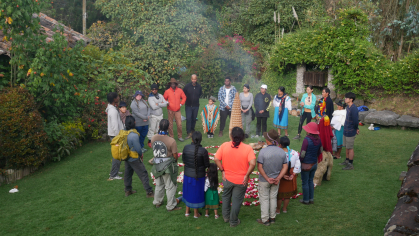More Teens Get a Head Start on College Life as Dual Enrollment Program Expands

Newark high schooler Jedidah Wilson spent her summer earning college credits while learning how to code and analyze the workings of AI. She admits it wasn’t always fun.
“I’m not going to lie, it was hard work,’’ said Wilson, a junior at Bard High School Early College in Newark, who completed the new Create Academy offered through Rutgers-Newark’s Center for PreCollege Programs.
But Wilson, who is often apprehensive about new experiences, overcame her anxiety, got the work done, and emerged with a newfound sense of confidence. It helped her decide that college, which once seemed so unfamiliar, is where she wants to be after graduation.
“Being on an actual college campus has opened my eyes. I had never seen anything like it before. Really seeing how college students act and do their work and stay focused, it taught me a lot. Just by doing that, it will help me get ready,’’ said Wilson, who is 17 and considering a medical career, possibly as an ultrasound technician.
Since it began in 2020, the Center for PreCollege Programs, has nearly doubled in size, serving more than 2,000 students from age 12 to 18 last year. The college acceptance rate for precollege students is 88 percent. Most students are from Newark and nearby towns but it accepts students from other counties as well.

The center includes a range of programs designed to meet students where they are, from introducing middle schoolers to STEM innovations to connecting high schoolers with professional mentors.
Many students come from families where higher education seems out of reach because no one in their families attended college. In PreCollege programs, they’re introduced to the possibilities of higher education.
“Research shows that early exposure to college environments is extremely important,” said Center for PreCollege Programs Dean Sheronia Rogers. “If they don’t get the opportunity to have that level of exposure, it makes it seem like it’s not a reasonable ask. But here, they’re engaging with faculty as early as the sixth grade.”
In the Dual Enrollment program, which expanded this summer with the Create Academy, many students also lack the resources to pay for college readiness and enrichment programs, so their courses also help them save money on tuition.
“Now they’ve learned elective credits that they don’t have to spend their scholarship or loan resources on,’’ said Rogers.
The center places a great emphasis on technology courses that can help students succeed in the classroom and in future careers. Wilson completed an iOS course funded through Apple’s Community Education Initiative, which provided scholarships so that all participating high school students could attend free of charge. The class is part of the regular School of Arts and Sciences–Newark curriculum, meaning that undergraduates take it as well.
“There is definitely career preparation and mastery of technology,” Rogers said. “It taught students how to use executive function tools to stay focused and productive. They increased their competency in study habits, public speaking, organization and time management—all through the lens of an introduction to the Apple iOS system.”
While most Dual Enrollment students are juniors and seniors with a GPA around 3.0 or higher, the program also considers motivated teens recommended by educators at its partner schools. The goal is not only for students to excel academically but gain self-assurance and learn about themselves and their potential.
“This summer, they’ve done so much more than learn apps - they shifted from students learning tools to young professionals using those tools with purpose. In our Discovering your Superpowers project, each student identified their personal strengths and reflected on how those traits show up in their learning,” said Mia Williams, an adjunct professor in the School of Arts and Sciences-Newark who was a program instructor.
This summer, the College and Career Institute—a dual enrollment program—highlighted career readiness with a speed interviewing event, where university staff, educators and local professionals coached students on communication and workplace interviewing skills.
In round-robin sitdowns lasting three to four minutes, they learned about the etiquette and protocols of the interview process. Students answered an array of questions, many of which encouraged them to reflect on their goals, strengths, weaknesses and motivations.
Interviewer Max Valcourt, who chairs the History department and Marion P. Thomas Charter School in Newark, stressed the importance of finding a sense of purpose.
“They might say, ‘I want to do good’ but if you don’t have a reason or a purpose, that’s not really going to help you,’’ he said.”Many of them were very clear about what they wanted to do but I wanted them to ask themselves why they wanted to do it. What’s the why?”


